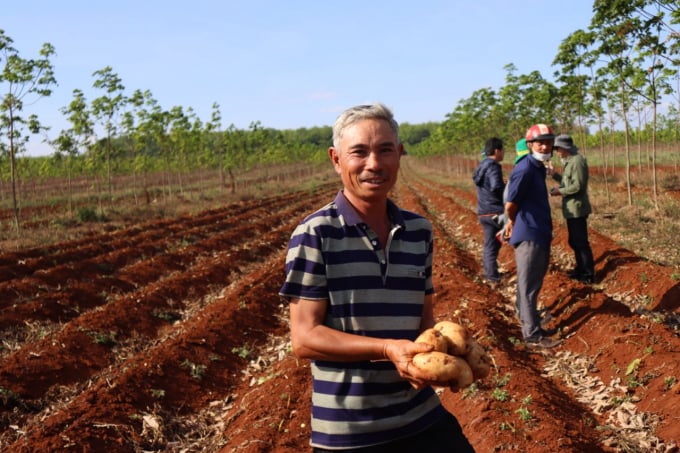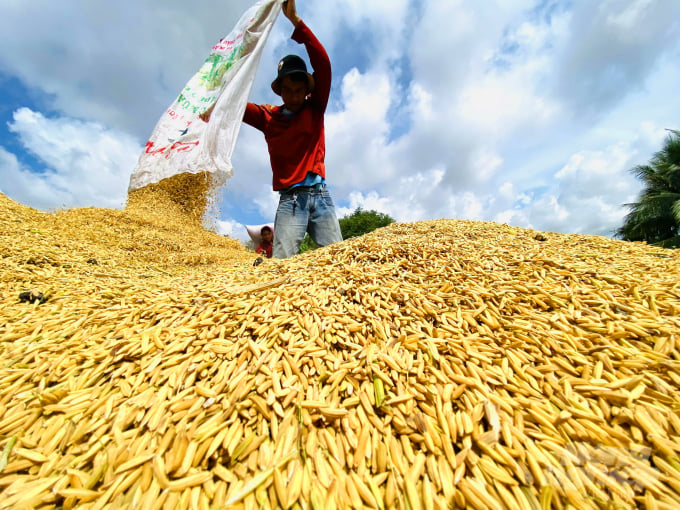June 19, 2025 | 04:11 GMT +7
June 19, 2025 | 04:11 GMT +7
Hotline: 0913.378.918
June 19, 2025 | 04:11 GMT +7
Hotline: 0913.378.918
The meeting of the Partnership for Sustainable Agricultural in Vietnam (PSAV) chaired by the Minister of Agriculture and Rural Development Le Minh Hoan took place on October 8th.
The meeting welcomed the participation of Mr. Binu Jacob, General Director of Nestlé Vietnam Co., Ltd. and Co-Chair of the PSAV’s Private sector, Mr. Reginald Lee, Program Director of Grow Asia, along with representatives of PPP Task Forces as well as domestic and international departments, organizations and corporations.

The meeting of the Partnership for Sustainable Agricultural in Vietnam (PSAV) chaired by the Minister of Agriculture and Rural Development Le Minh Hoan took place on October 8th. Photo: Duc Minh.
Making the opening speech, Minister Le Minh Hoan shared: "The Sustainable Agricultural Development Partnership (PSAV) meeting with the theme "Innovation towards a green agriculture" is a good opportunity for us to re-evaluate the effectiveness of public-private partnership in sustainable agriculture in the past time. This meeting can also help exchange more information, share experiences, promote cooperation, increase investment, and contribute to turning Vietnam into a leading food innovation hub in the region.”
The PSAV was established in 2010 under the “New Vision for Agriculture - NVA” which aims towards the goal of sustainable agricultural development; increase productivity by 20%, reduce poverty by 20%, and reduce emissions in agriculture by 20% (the 20-20-20 target).
The Vietnam Ministry of Agriculture and Rural Development together with domestic and international businesses have established the Public-Private Partnership (PPP) models for sustainable agricultural development in Vietnam in order to connect actors in the industry, share experiences and work together to develop the value chain of Vietnam’s key agricultural products.
The PPP model has been institutionalized into the Partnership for Sustainable Agricultural in Vietnam (PSAV), currently implementing 8 PPP Task Forces for each category: coffee, tea, vegetables, seafood, rice, pepper, livestock and agrochemicals, having received the participation of 120 organizations, including central and local government agencies, domestic and international companies, industry associations, research institutes research, international and non-governmental organizations.
After more than 10 years of operation, the PPP Task Forces through public-private partnership projects have developed many environmentally-friendly-sustainably demonstration farming models and increased income for farmers (such as Nestlé's coffee models, Unilever's tea models). The PPP Task Forces have also built a number of sustainable value link chains that meet 4C, UTZ, Rainforest Alliance international (such as the potato production and processing chain of PepsiCo., the rice chain of Bayer and Vinafood 2, the tea chain of Unilever, IDH and the Tea Association, etc.), conducted training for nearly 2 million farmers on sustainable farming methods.

Central Highlands farmers benefit from selling raw potatoes to PepsiCo. Photo: Nam Khanh.
PSAV has also contributed to the structural transformation of the agricultural economy especially in the processing industry and new-generation input supply sector; directly create jobs for 500,000 people and improve farmers’ skills; introduce new technologies and improve chain management capacity.
Moreover, according to Mr. Nguyen Do Anh Tuan, Director of the International Cooperation Department (ICD - MARD), FDI projects have contributed VND 6000 billion to the state budget every year, accounting for 3.2% of the total budget contribution of FDI and helps exports reach USD 8.6 billion, accounting for 20.8% of the total export turnover of agriculture - forestry - fishery products.
However, as it was established on the basis of initiative without precedent inside and outside the country, PSAV in the recent time has encountered several difficulties in the operation of the Task Forces and Secretariat:
The PSAV has yet attracted many domestic enterprises to participate; especially leading enterprises steering the value chain of the country’s national key industries;
There has not been a close connection between PPP Task Forces with local authorities, between large enterprises, SMEs, and local farmers' organizations;
Although projects of enterprises are currently implemented under the PPP model, the State has not yet had specific information on budget sources or a policy support package specifically for businesses participating in PPP Task Forces. There is no clear mechanism for the Co-chairs representing the "public" sector (which are units within the Ministry) to proactively promote the activities of the Task Forces;
Financial and human resources to maintain the operation of the PSAV Secretariat are limited.
After listening to the opinions of the participants of the Conference, Minister Le Minh Hoan said that there should be closer attention to international cooperation projects, and it is essential to strengthening the awareness and knowledge for the matter above.
Leaders of the Ministry of Agriculture and Rural Development reaffirmed the power of the public-private partnership: understanding the power of public-private partnership and mutual respect is the foundation of increasing cooperation efficiency, removing obstacles together.
Minister Le Minh Hoan hopes that cooperation programs will be more and more innovative, bringing new energy, new mindset, integrating multi-values into agriculture, and reaping many successes.
Also at the meeting, Mr. Nguyen Do Anh Tuan, Director of the Department of International Cooperation (Ministry of Agriculture and Rural Development), presented the Food Innovation Hub in Vietnam.
The Food Innovation Hub in Vietnam will link domestic and cross-border innovation networks to promote the application of digital technology and help innovate the development of smart-agricultural value chains; expand the scale and accelerate the transformation of Vietnam's existing food systems into a "green", sustainable, low-emission food system.

The representative of the World Economic Forum (WEF) regarded Vietnam as an "agricultural powerhouse". Photo: LHV.
The Vietnam Ministry of Agriculture and Rural Development is currently working closely with the World Economic Forum (WEF) and Grow Asia, studying how to implement the Food Innovation Hub in Vietnam, and connecting with potential networks, initiatives, and partners.
Food Innovation Hub in Vietnam, in accordance with the proposed operation, will be built and operated as a multi-stakeholder, interdisciplinary, pre-competitive and neutral organization to further strengthen the innovation ecosystem, developing based on the existing network and experience of Vietnam's food system as a PSAV member.
Speaking at the meeting as a special guest, Ms. Maria - representative of the World Economic Forum (WEF), regarded Vietnam as an "agricultural powerhouse" and congratulated Vietnam on becoming one of the first countries to implement the initiative. “The Food Innovation Hub is like a long and grand journey which requires effort, focus and dedication,” the WEF representative shared.
Translated by Samuel Pham

(VAN) After 5 years of implementation, the CAI initiative has helped coffee growers change their farming practices, moving toward responsible agriculture that meets global export standards.

(VAN) The primary prerequisite for the comprehensive and robust integration of Vietnam's livestock sector into the global value chain is the establishment of a disease control system.

(VAN) The results of national programs are essential for establishing a contemporary livestock sector that is well-equipped to meet the demands of both domestic and international markets, with robust biosafety standards.

(VAN) The UNESCO Global Geopark revalidation of Non nuoc Cao Bang and the transition to a two-tier administrative model are presently undergoing a pivotal moment in Cao Bang, the northernmost province of Vietnam.
/2025/06/13/5330-2-004539_953.jpg)
(VAN) Changing policy mindset and removing investment barriers are urgent requirements to open up new development space for enterprises in the agricultural sector.

(VAN) The areas include the restoration of five million hectares of marine ecosystems.

(VAN) Dr. Le Van Nguyen, Director of the Institute of E-Commerce Management (ECM), emphasizes the potential for green development through the cultivation of fruit trees, particularly in provinces such as Son La.